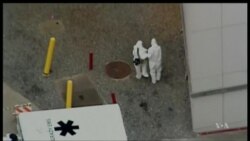News that a Texas man was diagnosed with Ebola after returning home from a visit to Liberia has raised new concerns about the spread of the disease. For health workers the stakes are particularly high - more than 120 have died in West Africa since the Ebola outbreak began early this year. In the United States, public health experts are working to reassure the public and medical workers that the virus does not endanger communities here.
The first Ebola patient to arrive in the United States flew on a plane specially equipped and designed to prevent the spread of the virus. That patient, Kent Brantly, entered Emory University hospital through a special passage to the isolation unit.
During a news conference outside the hospital, Jay Varkey reassured the public that they were not at risk.
“I can’t think of a better place in the world, other than this hospital at Emory University, to care for this patient,” said Varkey.
Some hospitals in developed countries have isolation units equipped with their own laboratories. Technicians do all the lab work right in the unit. And yet, not every worker at Emory was comfortable with having an Ebola patient there.
"There was a lot of feedback that we got back from our staff that this infection is a death sentence. This infection can have 90 to 100 percent mortality rates," said Varkey.
Varkey and the hospital's other infectious disease experts met with staff members.
"We had key leaders in both nursing as well as the medical staff, infectious diseases [departments] who actually rounded in the hospital itself, from nursing station to nursing station and from unit to unit to make ourselves available to answer questions," recalled Varkey.
Brantly eventually recovered, as did a second patient, Nancy Writebol. Rick Sacra, the third Ebola patient flown to the U.S., was successfully treated at the University of Nebraska Hospital.
"Though my crisis has reached a successful end here, unfortunately, the Ebola crisis continues to spin out of control," said Sacra.
Modern hospitals in developed countries are far different from the situation in Africa, where more than 240 medical workers have contracted Ebola in recent months. Most hospitals lack the supplies to contain the disease. In one Ebola holding facility in Sierra Leone, at least three employees have died of the virus.
Nurses recently protested in Las Vegas, saying they are not trained to treat Ebola patients. Surveys show many Americans are afraid the Ebola virus might spread inside the U.S.
Thomas Frieden, the director of the U.S. Centers for Disease Control and Prevention, tried to tamp down concerns after a Texas hospital admitted the Ebola patient who had arrived last month from Liberia.
"It's only spread by someone who is sick with the virus. And it's only spread through body fluids," said Frieden.
Frieden said the Ebola virus is something to fear, but as more people get into treatment early, more people will survive.





